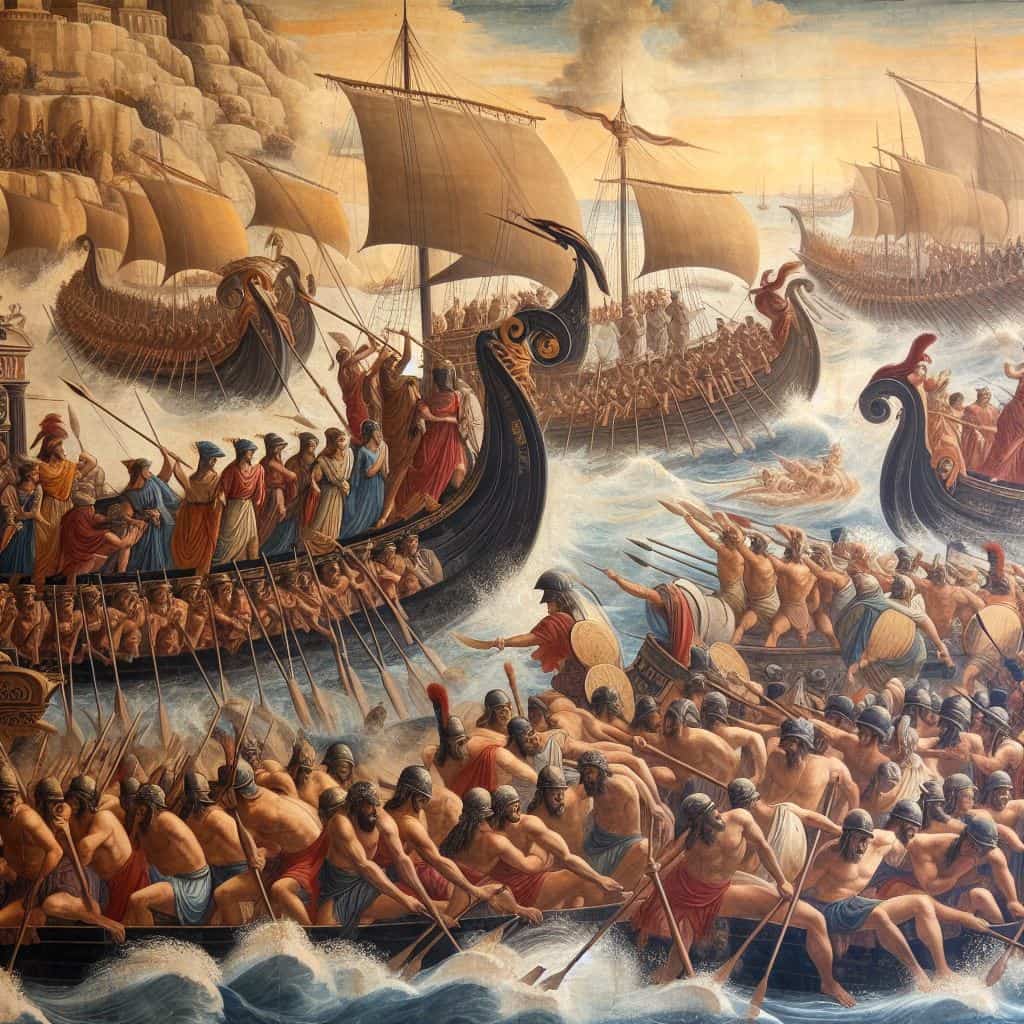The Aftermath of the Peloponnesian War: Unraveling the Consequences for Greece’s Ancient Powers
In the annals of ancient history, few events have had as far-reaching consequences as the Peloponnesian War. Lasting for almost three decades, this conflict between Athens and Sparta not only reshaped the political landscape of Greece but also had a profound impact on the ancient powers of the region. As the dust settled and the victors emerged, Greece found itself grappling with the aftermath of this devastating war.
In this article, we delve deep into the repercussions of the Peloponnesian War and explore the profound changes it brought to the ancient powers of Greece. From the rise of Thebes and the decline of Sparta to the political upheavals in Athens, we unravel the intricate web of consequences that forever altered the balance of power in the region.
Join us on this journey through history as we examine how the Peloponnesian War reshaped the ancient powers of Greece. Discover the long-lasting effects of this epic conflict and gain a deeper understanding of the lasting imprint it left on Greek history.

Key players in the Peloponnesian War
The Peloponnesian War involved several key players, each with their own unique roles and agendas. At the forefront of this conflict were the two superpowers of ancient Greece: Athens and Sparta.
Athens, the flourishing democracy known for its cultural achievements, had emerged as a dominant maritime power in the Aegean region. Led by influential figures such as Pericles, Athens had built an extensive empire, controlling numerous city-states and islands through its powerful navy and economic might.
In contrast, Sparta was a militaristic state renowned for its disciplined and formidable land-based army. Sparta had long been a rival of Athens and sought to maintain its hegemony over the Peloponnesian League, a coalition of city-states in the southern region of Greece.
Beyond these two primary antagonists, the war also drew in other significant players, including Thebes, Corinth, and various smaller city-states. These allies and rivals shifted their allegiances throughout the conflict, further complicating the political landscape of ancient Greece.
The causes and events of the Peloponnesian War
The roots of the Peloponnesian War can be traced back to the aftermath of the Persian Wars, which had brought Athens and Sparta together in a common cause. However, the growing power and influence of Athens soon led to tensions and rivalries between the two city-states.
The immediate trigger for the war was a dispute between Corinth, an ally of Sparta, and the island of Corcyra, which was under the influence of Athens. When Corcyra sought Athenian support, Sparta saw this as a threat to its own interests and issued an ultimatum to Athens, demanding the city-state withdraw its support.
Athens, confident in its strength and unwilling to back down, refused the ultimatum, leading Sparta to declare war in 431 BCE. The ensuing conflict would last for nearly three decades, marked by periods of intense fighting, uneasy truces, and shifting alliances.
The war saw the deployment of various military strategies, including naval battles, sieges, and land-based campaigns. The Athenians, led by Pericles, initially adopted a defensive strategy, relying on their naval superiority and the fortifications of the city. However, the outbreak of a devastating plague in Athens severely weakened the city and its leadership.
The consequences of the Peloponnesian War
The Peloponnesian War had far-reaching consequences that reshaped the political and cultural landscape of ancient Greece. The conflict left a lasting impact on the major powers involved, as well as the smaller city-states caught in the crossfire.
One of the most significant consequences was the decline of Athens, once the shining beacon of Greek democracy and cultural achievement. The city’s loss of its empire, the devastation of the plague, and the eventual defeat at the hands of Sparta all contributed to the erosion of Athenian power and influence.
The war also led to the rise of Thebes, a city-state that had previously played a secondary role in Greek politics. Thebes, led by the charismatic general Epaminondas, emerged as a new power in the region, challenging the traditional dominance of Sparta and Athens.
The fall of Athens and the rise of Thebes had a profound impact on the balance of power in ancient Greece. The once-mighty Spartan hegemony also began to wane, as the city-state struggled to maintain its control over its allies and the Peloponnesian League. This shift in the political landscape would have far-reaching consequences for the future of Greece.
Impact on Athens: Loss of power and influence
The Peloponnesian War dealt a devastating blow to the power and influence of Athens. The city, once the preeminent cultural and political center of ancient Greece, found itself in a precipitous decline after the war.
The loss of its extensive maritime empire was a significant setback for Athens. The city had built its wealth and power on the backs of its subject city-states, which provided resources, tribute, and military support. With the defeat of Athens, these allies were freed from Athenian control, and the city’s economic and political influence diminished.
The ravages of the war also took a heavy toll on the Athenian population. The outbreak of the plague, which claimed the life of the influential leader Pericles, further weakened the city’s defenses and morale. The subsequent leadership struggles and internal political turmoil only exacerbated the city’s decline.
The final blow came with the defeat of Athens by Sparta and its allies. The city was forced to surrender, dismantle its fortifications, and surrender its fleet. This loss of military power and autonomy marked the end of Athens’ golden age and its status as the preeminent power in ancient Greece.
Impact on Sparta: Rise and fall of Spartan hegemony
The Peloponnesian War had a profound impact on the fortunes of Sparta, the traditional rival of Athens. Initially, Sparta emerged as the victor, solidifying its position as the dominant power in the region.
Sparta’s triumph over Athens allowed it to assert its hegemony over the Peloponnesian League, a coalition of city-states that had previously been under Athenian influence. Sparta’s disciplined and formidable land-based army proved to be the decisive factor in the war, as it was able to counter the naval superiority of Athens.
However, Sparta’s victory was not without its own consequences. The long years of war had taken a toll on the city-state, both in terms of manpower and resources. Sparta’s reliance on its allies and the Peloponnesian League also led to tensions and resentments, as the smaller city-states chafed under Spartan domination.
Over time, Sparta’s hegemony began to unravel. The rise of Thebes, a former ally of Sparta, challenged the city-state’s dominance. Thebes, led by the brilliant general Epaminondas, inflicted a devastating defeat on Sparta at the Battle of Leuctra in 371 BCE, marking the decline of Spartan power.

Impact on other Greek city-states: Shifting alliances and power dynamics
The Peloponnesian War not only impacted the major powers of Athens and Sparta but also had significant consequences for the smaller Greek city-states caught in the crossfire.
As the conflict unfolded, these smaller city-states found themselves in a precarious position, forced to navigate the shifting alliances and power dynamics that emerged during the war. Many were compelled to align themselves with either Athens or Sparta, often facing the threat of retaliation or subjugation if they chose the wrong side.
The rise of Thebes as a new power in the region further complicated the political landscape. Smaller city-states were drawn into the orbit of Thebes, as the city-state sought to challenge the traditional hegemony of Sparta and Athens. This resulted in a complex web of shifting alliances, as city-states maneuvered to protect their own interests and avoid being caught in the crossfire.
The consequences of these shifting alliances were far-reaching. Some city-states, such as Corinth and Megara, suffered greatly from the war, their economies and populations decimated by the conflict. Others, like Thebes, were able to leverage the war to their advantage, gaining power and influence at the expense of their rivals.
The decline of ancient Greece: Cultural and political ramifications
The Peloponnesian War not only reshaped the political landscape of ancient Greece but also had a profound impact on the cultural and social fabric of the region.
The prolonged conflict and the devastating losses suffered by the major city-states led to a significant decline in the cultural and intellectual achievements that had previously defined ancient Greece. The golden age of Athens, marked by the flourishing of the arts, philosophy, and democracy, came to an abrupt end, as the city struggled to recover from the war’s aftermath.
The political turmoil and the erosion of traditional power structures also had a destabilizing effect on the social and cultural institutions of ancient Greece. The once-vibrant city-states found themselves grappling with internal strife, economic hardship, and a loss of civic identity. This period of uncertainty and decline paved the way for the eventual rise of Macedonian power, which would come to dominate the region in the following century.
The Peloponnesian War’s impact on ancient Greece’s cultural and political landscape was far-reaching and long-lasting. The loss of Athens’ cultural and intellectual leadership, the weakening of Sparta’s military dominance, and the emergence of new power centers like Thebes all contributed to the gradual decline of the ancient Greek world.
Lessons learned from the Peloponnesian War
The Peloponnesian War, despite its devastating consequences, offers valuable lessons that continue to resonate in the study of history and political science.
One of the key lessons is the danger of unchecked ambition and the pursuit of power at all costs. The rivalry between Athens and Sparta, fueled by their desire for hegemony and the expansion of their respective spheres of influence, ultimately led to a prolonged and destructive conflict that weakened both city-states. This serves as a cautionary tale about the need for moderation and the recognition of the limits of power.
The war also highlights the importance of effective leadership and the role of individual decision-making in shaping the course of history. The leadership of figures like Pericles and Epaminondas had a profound impact on the trajectory of the conflict, demonstrating the significance of strategic vision, diplomatic acumen, and the ability to rally support.
Furthermore, the Peloponnesian War underscores the fragility of alliances and the shifting nature of political loyalties. The complex web of shifting allegiances and the betrayal of former allies serve as a reminder of the need for nuanced and flexible foreign policy, as well as the importance of maintaining a balance of power in geopolitical affairs.
Conclusion: The lasting legacy of the Peloponnesian War on Greece and the ancient world
The Peloponnesian War stands as a pivotal moment in the history of ancient Greece, with far-reaching consequences that continue to resonate to this day. The conflict not only reshaped the political landscape of the region but also had a profound impact on the cultural, social, and intellectual fabric of the ancient Greek world.
The decline of Athens and the rise of Thebes, the erosion of Spartan hegemony, and the destabilization of the smaller city-states all contributed to the gradual decline of ancient Greece’s golden age. This period of turmoil paved the way for the eventual rise of Macedonian power, which would come to dominate the region in the following century.
Yet, the lessons of the Peloponnesian War continue to hold relevance, serving as a cautionary tale about the dangers of unchecked ambition, the importance of effective leadership, and the fragility of political alliances. The study of this epic conflict remains a crucial part of understanding the complexities of ancient Greek history and the enduring legacies that continue to shape our understanding of the past and its impact on the present.
As we reflect on the aftermath of the Peloponnesian War, we are reminded of the profound impact that a single conflict can have on the course of history. The unraveling of the ancient powers of Greece serves as a poignant reminder of the fragility of even the mightiest of civilizations, and the enduring lessons that can be drawn from the study of this pivotal moment in the annals of ancient history.


